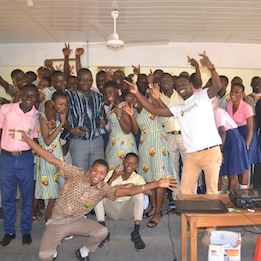A conversation with Prosper Adiku and Rahinatu Sidiki Alare on the CATYI (Climate Change Adaptation Through Youth Innovation) high school competition
What first sparked your interest to do a school competition?
Prosper – We developed the CATYI (Climate Change Adaptation Through Youth Innovation) competition based on the conviction that young people need to be actively involved in identifying environmental problems, and finding and communicating innovative solutions. The future of climate change adaptation lies in their hands!
What is one thing that surprised you about this activity?
Rahina – The high level of enthusiasm among students with regards to environmental issues. All participants were really looking forward to implementing their ideas on the ground.
What will the students take away from this experience?
Prosper – Through the competition, the students have enhanced their communication and innovative capacities; they have also acquired enormous exposure on climate related issues as well as linkages to researchers at the Institute for Environment and Sanitation Studies (IESS) of the University of Ghana and youth based environmental organizations such as Greener Impact and Environment 360. Teachers and environmental club patrons of the schools involved have also had the opportunity to benefit from the competition by participating in a collaborative capacity building workshop with our partners Nandom Deanery Integrated Rural Development Programme (NANDIRDEP) and Greener Impact International.
Rahina – The students have been included as key members of the Climate Change and Sustainable Development activities of Greener Impact International, a Accra-based NGO, and are expected to participate in next year’s activities as well.
Did you personally learn something new or important from overseeing this project?
Rahina – While lecturing undergraduate students on climate change at the Department of Environmental Science of the University for Development Studies (UDS), I have used some of the ideas from the competition to highlight ways in which the youth can contribute to adaptation actions in their communities.
Prosper Adiku is Research Assistant at the Institute for Environment and Sanitation Studies (IESS), University of Ghana and Rahinatu Sidiki Alare is Assistant Lecturer at the Department of Environmental Science, University for Development Studies, Tamale, Ghana
First published on ProSus Magazine, June 2019



